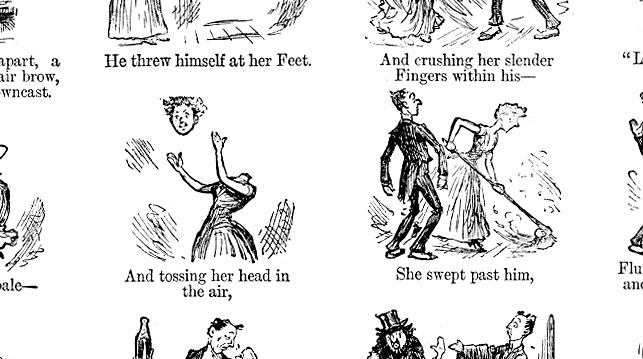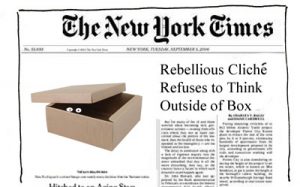
In Part 1, we talked about what clichés are, why they’re bad, and what they’re not. This time, we’re looking at why people keep using them anyway and just where the tired, stale things like to hide.
Why Are Clichés So Irresistible?
Clichés serve many purposes. Unfortunately, they’re all bad.
Clichés Are Easy
Writers are lazy, and in daily life we tend to write in a hurry, so we’ll take whatever shortcuts we can, including abbreviations, acronyms, references to other people’s words, and sometimes just sort of nodding along (for now).
Clichés do all these things. They’re communicative shortcuts, rubber stamps of vague consensus from common cultural ground.
So the instructor wants you to write a book report, and all you can think is that you sort of liked it? Clichés away!
Get a free sample proofread and edit for your document.
Two professional proofreaders will proofread and edit your document.
Top management wants you to rally your team, and you have only a vague idea to get everyone fired up? Clichés to the rescue!
Clichés Are Public Domain
Not only are clichés fill-in-the-blank phrases, they also don’t belong to anyone. We aren’t responsible for what clichés actually mean. We aren’t really pledging 110% percent because it’s impossible.
Clichés are actually slang, so if someone doesn’t understand what we “mean” when we use a cliché, it’s their fault for not “getting it.”
Even better, clichés let us use other people’s words without giving anybody credit. If I say, “By the pricking of my thumbs, something wicked this way comes,” I’d better know that’s Shakespeare. But if I say that something “sticks out like a sore thumb,” I don’t claim to know where that phrase came from, and no one expects me to.
Clichés Are Pretty Much Meaningless
Yes, the very thing that makes them so bad is also why they’re so attractive.
Who can actually fault us for not “putting our noses to the grindstone” or “keeping an ear to the ground”? What “box” is it, exactly, we’re supposed to be thinking outside of?
Take all the clichés out there, and they basically mean good/bad, yes/no, I’ll try/life is futile, and things are changing/things never change.
Using a cliché is a type of surrender. You don’t really know what you want to say, and you pretty much assume your audience doesn’t care either.
Yet Clichés Don’t Feel Meaningless
And this is the most deceptive appeal of all. When we use a cliché and the audience recognizes it, we feel understood, when in fact it’s only the cliché that’s understood. Our meaning is just some small residue stuck to that trite phrase.
Where Clichés Hide
 OK, so you’ve decided you don’t want to use clichés. If only that meant they would just pack their bags and go.
OK, so you’ve decided you don’t want to use clichés. If only that meant they would just pack their bags and go.
The problem is that clichés hide. We get used to them and don’t see them anymore. We’re trying to be honest and original, but suddenly we’re saying things like “I’m a driven self-starter with excellent people skills,” “I want to take this to the next level,” and “You complete me.”
So how do we put on our cliché-spotting goggles? We must know where they hide.
Metaphors
Figurative comparisons (metaphors) can be incredibly powerful: evocative, emotional, inspiring to the imagination and fulfilling to the soul. In the Aeneid, Virgil compares Neptune’s calming of the stormy sea to the way a leader calms a crowd of angry men. When we drink a great beer, we might call it “nectar of the gods.” When someone hot likes us, we’ve “hit the jackpot.”
Frankly, it’s hard to say much at all without using a metaphor/simile, which is great, except that a good metaphor is difficult to create. We actually have to sit there and come up with something to compare with something else that’s useful, and that’s not easy. So we tend to grab up something already in use, even when it’s old and worn-out.
A thousand bad sex-scene clichés spring to mind:
(That last one is from E. L. James’s Fifty Shades of Grey. What? People were using that cliché long before that? Imagine such a thing!)
Uncomfortable Self-Expression
And here, finally, is where clichés grow like mushrooms in a dank shower stall.
We use clichés when we don’t want to say what we really feel, either because it’s too much trouble to dig down deep or (more often) we don’t want people to see us for ourselves.
We’re applying for a job, internship, college admission, grant, leniency from the law, forgiveness from a friend, or a second chance from a lover. The audience wants to know what makes us special, what sets us apart. Meanwhile, we fear that, if the audience knows who we are, they won’t like us.
So we resort to clichés:
The only true way to break away from using clichés is to realize that no tired string of words is going to mean what you actually want to say. That doesn’t mean you can’t use a phrase you’ve heard before; just don’t use one you’ve heard so many times that it tempts you with its familiar, comforting nothingness.
Julia H.
Get a free sample proofread and edit for your document.
Two professional proofreaders will proofread and edit your document.
Get a free sample proofread and edit for your document.
Two professional proofreaders will proofread and edit your document.
We will get your free sample back in three to six hours!